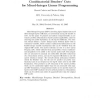10 search results - page 2 / 2 » Minimal MLPs do not model the XOR logic |
EUSFLAT
2009
13 years 3 months ago
2009
One of the new trends in genetic fuzzy systems (GFS) is the use of evolutionary multiobjective optimization (EMO) algorithms. This is because EMO algorithms can easily handle two c...
RECOMB
2007
Springer
14 years 5 months ago
2007
Springer
Association, or LD (linkage disequilibrium), mapping is an intensely-studied approach to gene mapping (genome-wide or in candidate regions) that is widely hoped to be able to effic...
JELIA
2004
Springer
13 years 11 months ago
2004
Springer
Abstract. Often, decision making involves autonomous agents that are structured in a complex hierarchy, representing e.g. authority. Typically the agents share the same body of kno...
AAAI
2007
13 years 8 months ago
2007
There are a number of frameworks for modelling argumentation in logic. They incorporate a formal representation of individual arguments and techniques for comparing conflicting a...
IOR
2006
13 years 5 months ago
2006
Mixed-Integer Programs (MIP's) involving logical implications modelled through big-M coefficients, are notoriously among the hardest to solve. In this paper we propose and an...

